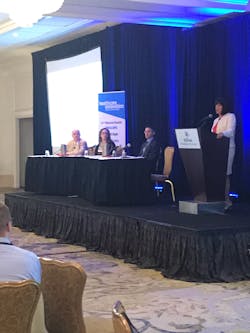In surveys, physicians regularly identify electronic health records (EHRs) as a contributing factor in burnout. Health systems are taking a variety of approaches to address the issue. At Healthcare Innovation’s Health IT Summit on June 3, informatics leaders from Nemours Children’s Health System described a program to give some physicians special training in informatics and an opportunity to work with their colleagues on EHR optimization.
Nemours has children’s hospitals in Wilmington, Del., and Orlando, Fla. Gina Altieri, senior vice president and chief of strategy integration, said that through surveys Nemours recognized health IT does play a role in physician burnout. The question was what to do to mitigate its addition to the stress physicians feel.
Although the health system has many IT analysts working with the Epic EHR, Altieri said they may not understand the struggles physicians have or their work flows. Nemours decided to start a program called Physician IT (PhIT) to enlist physicians with an aptitude for creating efficiencies and working with their colleagues. “We send them to Epic for training,” she said. Then they take times to observe clinicians and their workflow before developing some solutions.
In a panel session of Nemours executives, Altieri asked David West, M.D., medical director of health informatics, what attributes he looks for in potential candidates for PhIT. The first two he mentioned are a comfort in working with data, and people who like to work with applications and create things themselves. “The third is creating relationships with colleagues on a plane you are not used to,” he said. “You are coaching. You need to be good at establishing relationships with individuals and groups so that they have a feeling of having more control over their experience. The issue about engagement is partly about how much I can control what is happening to me and make the experience better.”
Matt Di Guglielmo, M.D., was recently named chief of the Division of General Pediatrics in the Department of Pediatrics
He said participation in a Physician Leadership Development Program has had a major impact on his career. It allowed him to get a better understanding of organizational dynamics and physician wellness. “Without exposure to those topics, it would be more challenging to take on a leadership role as division chief,” he said. “It has allowed me to relate better to faculty and colleagues.”
Asked about barriers to impacting physician burnout, Di Guglielmo said, “System inertia can prevent us from making changes.” He added that there is a move away from using the term burnout and more about a syndrome of depersonalization, exhaustion and a feeling of not accomplishing anything. “It is a complex, multifactorial issue and it requires time, money and personnel, which are not always easy to come by in healthcare. We are taking bold steps. Whether they always work is not as important as doing them and trying to make things better.”
Sara Slovin, M.D., a primary care physician in the Department of Pediatrics, who went through the PhIT program, said solutions have to be custom-designed to meet the individual physician’s needs. “First we meet with them to identify what they are struggling with,” she said. For some it is that documenting is taking too long and they are typing notes late at night. They may want to try Dragon dictation or using a scribe or more macro tools. “It is so valuable to see the ah-hah moment,” she said. Making documentation easier can change their experience of work. “Our goal is not to change work flow completely,” she added, “but to enhance it and make them feel better.”



